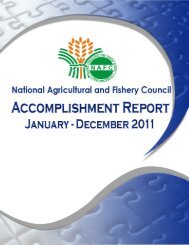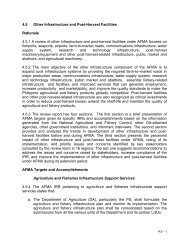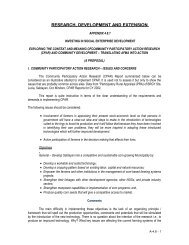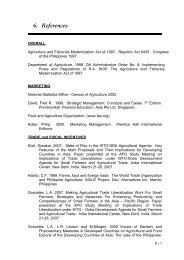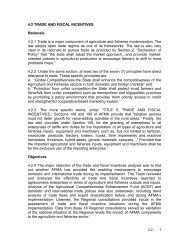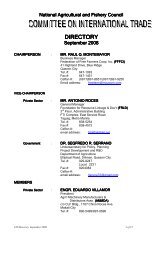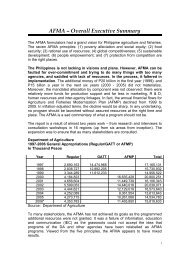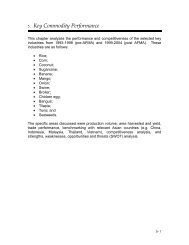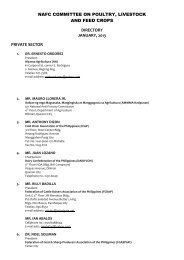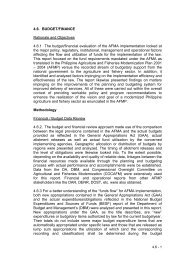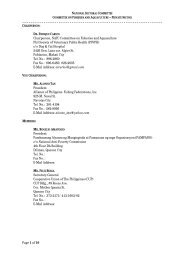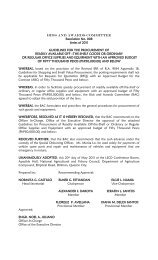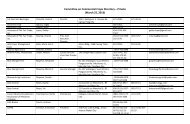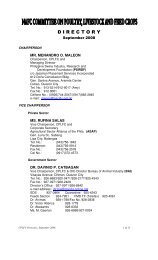NAF Council endorses agri-fisheries modernization plan - National ...
NAF Council endorses agri-fisheries modernization plan - National ...
NAF Council endorses agri-fisheries modernization plan - National ...
You also want an ePaper? Increase the reach of your titles
YUMPU automatically turns print PDFs into web optimized ePapers that Google loves.
The Diplomatic Conference<br />
on the Safety of Fishing<br />
Vessels conducted by the<br />
United Nations International<br />
Maritime Organization (IMO)<br />
from October 9 to 11 in Cape<br />
Town, South Africa has adopted<br />
a new agreement on fishing<br />
vessel safety, to be known as the<br />
“Cape Town Agreement of 2012<br />
on the Implementation of the<br />
Provisions of the 1993 Protocol<br />
Relating to the Torremolinos<br />
International Convention for the<br />
Safety of Fishing Vessels, 1977”.<br />
The diplomatic conference<br />
was attended by 62 Member-<br />
States of the IMO, the specialized<br />
agency of the UN with<br />
responsibility for maritime safety<br />
and security and the prevention<br />
of pollution from ships.<br />
The Philippine delegation<br />
was headed by H.E. Enrique<br />
Manalo, Ambassador of the<br />
Philippines to the United<br />
Kingdom of Great Britain and<br />
Permanent Representative to<br />
the IMO. He was joined by<br />
assistant head of the delegation,<br />
Atty. Francisco Noel Fernandez<br />
III, Political Affairs Minister,<br />
Embassy of the Philippines<br />
in London, and Alternate<br />
Permanent Representative of<br />
the Philippines to the IMO.<br />
The advisers in the Philippine<br />
delegation was composed of DA<br />
delegates, namely, Director Asis<br />
Perez of the Bureau of Fisheries<br />
and Aquatic Resources (BFAR);<br />
Dr. Jonathan Dickson, Chief<br />
of BFAR Capture Fisheries<br />
Division; Sarah Bales, Chief<br />
of the <strong>NAF</strong>C’s Fisheries and<br />
Aquaculture Section; as well as<br />
Engr. Jose Venancio Vero, Jr.<br />
Director of the Maritime Safety<br />
Office of the Maritime Industry<br />
Authority (MARINA) under the<br />
Department of Transportation<br />
and Communication (DOTC).<br />
The observers, on the other<br />
hand, were Rosanna Bernadette<br />
Contreras, Executive Director of<br />
SOCSKSARGEN Federation of<br />
Fishing and Allied Industries, Inc.<br />
(SFFAI); Earl Edgardo Alonso,<br />
Attaché, Philippine Embassy<br />
in South Africa; and Steven<br />
Chaimowits, Honorary Consul,<br />
Philippine Honorary Consulate<br />
in Cape Town, South Africa.<br />
6<br />
UN maritime conference adopts new<br />
agreement on fishing vessel safety<br />
<strong>NAF</strong>C representative among Philippine delegates<br />
October to December 2012<br />
The Diplomatic Conference on the Safety of Fishing Vessels<br />
was held to consider a new agreement on the implementation<br />
of the Torremolinos Protocol of 1993 Relating to the<br />
Torremolinos Convention, 1997 for the Safety of Fishing<br />
Vessels.<br />
In his opening remarks,<br />
IMO Secretary-General Koji<br />
Sekimizu addressed the need<br />
to come up with an agreement<br />
that will help boost the<br />
state of the fishing industry.<br />
“The significant changes<br />
in the fishing industry globally<br />
in the last twenty years call<br />
for renewed regulatory efforts,<br />
and the time is now ripe for an<br />
Agreement to be concluded such<br />
that its objectives be met on an<br />
international basis,” he said.<br />
“The Agreement reflects our<br />
renewed commitment and good<br />
hope that the provisions of the<br />
1993 Toremolinos Protocol will<br />
come into force, this time, in the<br />
very near future. I encourage all<br />
IMO member states and those<br />
which have a large number of<br />
fishing vessels, in particular,<br />
to ratify the Agreement<br />
without delay,” he added.<br />
The 1977 Torremolinos<br />
Convention was adopted in<br />
Torremolinos, Spain on April<br />
2, 1977 to provide uniform<br />
principles and rules concerning<br />
construction, equipment,<br />
stability, radio communications<br />
and other safety of new decked,<br />
seagoing fishing vessels of<br />
24 meters in length and over.<br />
Due to technical difficulties,<br />
however, the Convention did not<br />
enter into force. As an alternative<br />
solution, a Protocol was<br />
adopted in 1993 amending the<br />
Convention 16 years after. The<br />
Torremolinos Protocol updates,<br />
amends and absorb the parent<br />
Convention, taking into account<br />
the technological evolution in the<br />
intervening years and the need<br />
to take a pragmatic approach<br />
to encourage ratification of<br />
the instruments. The Protocol<br />
covers fishing vessels of 24<br />
meters in length and over.<br />
The DA, through<br />
BFAR and <strong>NAF</strong>C, took an<br />
active role in consolidating<br />
the commercial <strong>fisheries</strong><br />
sector in crafting a position<br />
paper, which was presented<br />
during the said conference.<br />
As urged by the Ocean<br />
Concerns Office of the<br />
Department of Foreign Affairs<br />
(OCO-DFA), <strong>NAF</strong>C convened<br />
a stakeholders’ meeting on June<br />
1, 2012, which officially formed<br />
the Task Force on Torremolinos<br />
Convention and Protocol (TF-<br />
TCP) led by BFAR, together with<br />
the MARINA, with members<br />
composed of the representatives<br />
from OCO-DFA, NTC, <strong>NAF</strong>C<br />
and industry organizations,<br />
namely, Alliance of Philippine<br />
Fishing Federations, Inc.,<br />
Inter-island Deep Sea Fishing,<br />
Inc., SFFAII, and Southern<br />
Philippines Deep Sea Fishing<br />
Association, Inc.. This initiative<br />
recognized the need to assess<br />
the impacts of the Torremolinos<br />
Protocol on the Philippine<br />
<strong>fisheries</strong> industry for compliance<br />
with the Protocol’s standard<br />
requirements for fishing vessels.<br />
The task force prepared<br />
the Philippine position that<br />
was submitted to the IMO.<br />
The Cape Town Agreement<br />
of 2012 will enter into force 12<br />
months after the date, on which<br />
22 States having an aggregate<br />
number of 3,000 fishing vessels<br />
of 24 meters in length or 300 gross<br />
tons capacity and over operating<br />
on the high seas, have expressed<br />
their consent to be bound by it.<br />
The Agreement will be open<br />
for signature at IMO Headquarters<br />
from 11 February 2013 to 10<br />
February 2014 and thereafter<br />
remain open for accession.<br />
The inter-agency technical<br />
working group led by the DA<br />
will conduct follow-through<br />
consultations to report the result<br />
of the Cape Town Conference and<br />
to solicit stakeholders’ positions<br />
on the Philippine ratification<br />
to the Cape Town Agreement<br />
on the implementation of the<br />
1993 Torremolinos Protocol.<br />
The Philippine delegation in the IMO diplomatic conference in<br />
Cape Town, South Africa, with Sarah Bales (fifth from left), Chief of<br />
the Fisheries and Aquaculture Section, representing <strong>NAF</strong>C.



